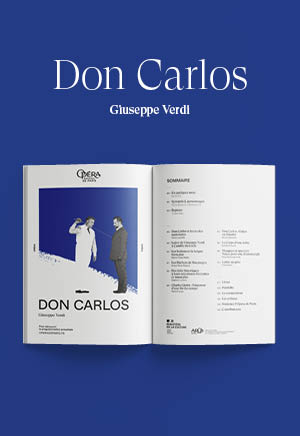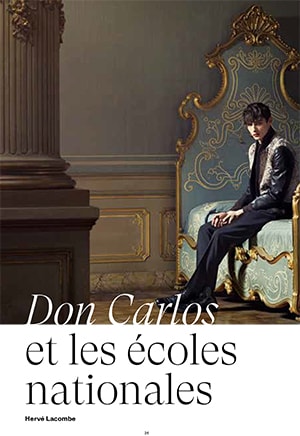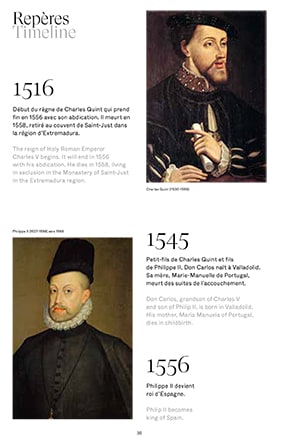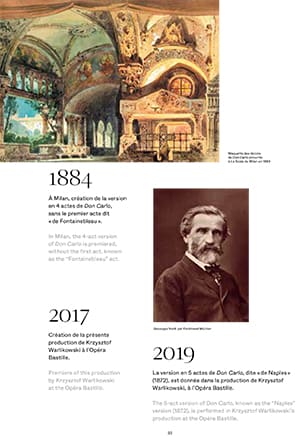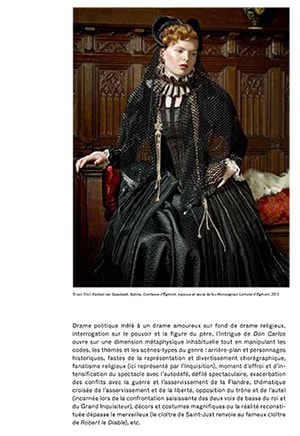Synopsis
Listen to the synopsis
Verdi’s Don Carlos, commissioned by the Paris Opera where it premiered in 1867, brought a new direction to the composer’s musical inspiration: a dark and intense score, in which political, religious and moral issues stir characters in the throes of inner torment.
Flowing into the mould of French grand opera without abandoning melodic richness, the composer of La Traviata and Rigoletto places less emphasis on the love story than on broader themes such as the solitude of power or the thirst for freedom, embodied by the Spanish infant, Don Carlos, and his friend Rodrigue, defender of the Flemish people.
This fascinating work’s Shakespearean dimension was bound to appeal to Krzysztof Warlikowski, whose staging reveals the secret inner worlds of the characters, prisoners of the court, the Church and etiquette.
Artists
Opera in five acts (1867)
After Friedrich von Schiller
Creative team
Cast
The Paris Opera Orchestra and Chorus
Media
Access and services
Opéra Bastille
Place de la Bastille
75012 Paris
Public transport
Underground Bastille (lignes 1, 5 et 8), Gare de Lyon (RER)
Bus 29, 69, 76, 86, 87, 91, N01, N02, N11, N16
Calculate my routeCar park
Parking Indigo Opéra Bastille 1 avenue Daumesnil 75012 Paris
Book your spot at a reduced price-
Cloakrooms
Free cloakrooms are at your disposal. The comprehensive list of prohibited items is available here.
-
Bars
Reservation of drinks and light refreshments for the intervals is possible online up to 24 hours prior to your visit, or at the bars before each performance.
-
Parking
You can park your car at the Indigo Opéra Bastille. It is located at 1 avenue Daumesnil, 75012 Paris.
In both our venues, discounted tickets are sold at the box offices from 30 minutes before the show:
- €35 tickets for under-28s, unemployed people (with documentary proof less than 3 months old) and senior citizens over 65 with non-taxable income (proof of tax exemption for the current year required)
- €70 tickets for senior citizens over 65
Get samples of the operas and ballets at the Paris Opera gift shops: programmes, books, recordings, and also stationery, jewellery, shirts, homeware and honey from Paris Opera.
Opéra Bastille
- Open 1h before performances and until performances end
- Get in from within the theatre’s public areas
- For more information: +33 1 40 01 17 82
Online
Opéra Bastille
Place de la Bastille
75012 Paris
Public transport
Underground Bastille (lignes 1, 5 et 8), Gare de Lyon (RER)
Bus 29, 69, 76, 86, 87, 91, N01, N02, N11, N16
Calculate my routeCar park
Parking Indigo Opéra Bastille 1 avenue Daumesnil 75012 Paris
Book your spot at a reduced price-
Cloakrooms
Free cloakrooms are at your disposal. The comprehensive list of prohibited items is available here.
-
Bars
Reservation of drinks and light refreshments for the intervals is possible online up to 24 hours prior to your visit, or at the bars before each performance.
-
Parking
You can park your car at the Indigo Opéra Bastille. It is located at 1 avenue Daumesnil, 75012 Paris.
In both our venues, discounted tickets are sold at the box offices from 30 minutes before the show:
- €35 tickets for under-28s, unemployed people (with documentary proof less than 3 months old) and senior citizens over 65 with non-taxable income (proof of tax exemption for the current year required)
- €70 tickets for senior citizens over 65
Get samples of the operas and ballets at the Paris Opera gift shops: programmes, books, recordings, and also stationery, jewellery, shirts, homeware and honey from Paris Opera.
Opéra Bastille
- Open 1h before performances and until performances end
- Get in from within the theatre’s public areas
- For more information: +33 1 40 01 17 82
Online

Discover opera and ballet in another way

Dive into the Opera world and get insights on opera and pop culture or ballet and cinema. Scan this code to access all the quiz and blindtests on your mobile.

3 min
Don Carlos
Verdi's Don Carlos, the true/false story
Thwarted love set against political alliances. Will you untangle this complex synopsis of Verdi’s Don Carlos? You’re up!
DiscoverYou will also like



















































